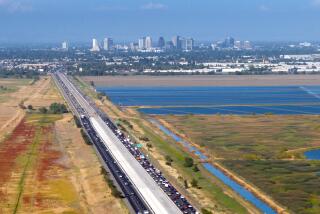South Pasadena Meets the Enemy in Freeway Talks : Transportation: Two city officials join Caltrans and others on a board that is seeking ways to lessen the impact of the proposed extension. But attending a meeting is not the same as acquiescence.
WEST SAN GABRIEL VALLEY — The freeway fighters from South Pasadena didn’t exactly become lambs last week, but they did lie down with the lions by going to the bargaining table with their archenemy, the highway builders from the California Department of Transportation.
Two South Pasadena officials joined an 11-member advisory panel as it convened in Alhambra on Wednesday to seek ways to lessen the impact of a proposed 6.2-mile extension of the Long Beach Freeway (710) through South Pasadena.
But even as the anti-freeway forces resigned themselves to minority status on the panel, they launched new salvos in their decades-long war of words over the proposed project that would connect the San Bernardino Freeway (10) in Los Angeles with the Foothill Freeway (210) in Pasadena.
The opponents of the freeway extension complained about the makeup of the panel, saying it should be expanded to include more environmental and preservation groups such as the Sierra Club and the Los Angeles Conservancy. Then they blasted the panel’s decision to hold part of its six-hour meeting in secret so panelists could decide privately whether to let the public attend future meetings.
And before the panel convened, the critics staged a rally-the-troops press conference to declare once more their staunch opposition to the $660-million project and to say they participated in the talks with a mixture of trepidation and hope.
Although anti-freeway forces expressed uncertainty about what they might gain, South Pasadena Mayor Harry A. Knapp, who is a panelist, said at the press conference: “We will attend these so-called advisory meetings in good faith. We expect to be dealt with in good faith.”
More dispiritedly, South Pasadena’s anti-freeway lawyer from San Francisco, environmentalist Antonio Rossmann, said the small city’s inclusion on the advisory panel appears to be “an invitation to design and ‘mitigate’ our funeral.”
Yet, striking a more optimistic note as he addressed the panel later in the day, Rossmann said he hopes that the group can “lead to solutions that no one had thought about before.”
Outside the committee meeting room, he added: “We’re going to try to make this committee do a better job than Caltrans wants it to do. The way we can make this a winning situation for us is to make the committee look at other alternatives.”
For their part, state and federal highway officials avoided direct response to the ire of freeway opponents.
James McCarthy, a Caltrans official in the Los Angeles regional office, just said of South Pasadena: “We’re glad they’re willing to participate.”
In March, when the state highway officials--at the behest of their federal counterparts--first proposed the advisory panel, South Pasadena officials had expressed little desire to serve on it.
AlvaLee Arnold, chairwoman of the city’s transportation commission, had said South Pasadena was asked to be on it only “to let us decide whether we want petunias or carnations” along the freeway.
Eventually, city officials concluded that there was more to gain by attending than by boycotting the sessions.
Regardless, last week the highway officials emphasized that they consider the voluntary creation of the advisory panel a rare event in such freeway battles. They said they will seriously consider the panel’s suggestions for reducing the project’s impact on scores of historic houses and thousands of mature trees, not only in South Pasadena but also in Los Angeles and Pasadena.
*
Roger Borg, head of the Federal Highway Administration’s California division, told the panel that he hopes its work “will provide a model for others throughout the country.”
And Jerry Baxter, regional director for the Los Angeles office of Caltrans, called it “a unique opportunity . . . to be creative” with a transportation project.
After the first session, Knapp said the meeting “was better than we thought it would be.”
Another freeway opponent on the panel, Kathryn Burns, a regional director of the National Trust for Historic Preservation, said: “We all want to resolve this issue, not stall it. Talking with each other is a good first start.”
Besides South Pasadena, the cities of Los Angeles, Pasadena and Alhambra sent two members each.
*
The Los Angeles County Transportation Commission and the Southern California Assn. of Governments also each have one representative.
In one of its first decisions, the panel decided to open its meetings to the public after representatives for all four cities expressed concern about the need to comply with the state’s open meeting law.
And, in a potential concession to freeway opponents, the panel’s first day of deliberations included a debate over whether to expand its membership. But, after reaching no conclusion, the members decided to continue that discussion at the next meeting, scheduled Sept. 24.
One federal highway official and one Caltrans official each serve as ex-officio members.
The panel is scheduled to make its recommendations by January to state and federal highway officials. The final design could begin soon after.
Earlier this year, state and federal highway officials, along with Gov. Pete Wilson, gave a tentative go-ahead for the roadway. The advisory panel was an outgrowth of the formal federal approval in March of an environmental study on the project.
More to Read
Sign up for Essential California
The most important California stories and recommendations in your inbox every morning.
You may occasionally receive promotional content from the Los Angeles Times.









